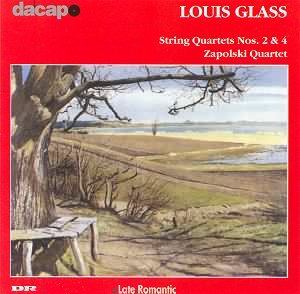LOUIS GLASS (1864-1936)
String Quartet No. 2 in A Minor op. 23 (1896 rev 1929)
32.38
String Quartet No. 4 in F Sharp Minor op. 35 (1907)
45.14
 Zapolski
Quartet
Zapolski
Quartet
 rec Danish Radio 1998 DA
CAPO MARCO POLO 8.224048 77.54
rec Danish Radio 1998 DA
CAPO MARCO POLO 8.224048 77.54

Glass took a different, and for his music less successful, route from his
contemporary and countryman Carl Nielsen. Glass with a strong creative faculty,
and no mean tunesmith, occupied the late-romantic territory. He could not
be considered a modernist. Glass is a confident exponent of the heartland
established by Tchaikovsky and Grieg. He might well be regarrded as a
reaxctionary but his way with thematic invention is strong and individualistic.
There are four Glass string quartets of which the 'true' no. 2 has been lost.
The one labelled no. 2 on this disc was in fact the third. First written
in 1896 it was reworked in 1929. Whatever the number the A Minor work is
tenebrous, romantic, but not one of blooming confidence. The mood is twilit
and on the darker margins of twilight. You may think of Grieg but with an
early 20th century accent. At times the music seems to picture a populated
street palely lit by candles and humming with amorous intrigue and threat.
The quartet strikes the listener more as an exploration of mood rather than
a grand propulsive musical statement. In the finale a Brucknerian tension
(lit up by some taut and quiet writing) is undeniable.
The fourth and final quartet is as big as the Fourth Symphony (to be recorded
by Danacord). The first movement has a stronger propellant than the A Minor
work but tends, very easily, towards the sort of reflection typified by
Miaskovsky. This continues amid the ghostly lanterns of the adagio. Much
of the writing is Nordicly succulent and the hesitant sorrowing serenading
of the adagio cuts a fine figure not that far distant from Wagner's
Siegfried Idyll and Atterburg's desperately under-rated Third Suite.
The scherzando takes a while to get under full steam but once it finds its
feet it has a sturdy Dvorakian charm - restrained rather than relaxed. The
martial glint of the allegro marciale is not about the dazzle of the
parade ground but relates to nocturnal manoeuvres in which the focus is rather
on the murderous edge on the unsheathed bayonets than the spit and polish
of military ceremony.
There is nothing here to match the world-shaking mastery of the Fifth Symphony.
These quartets are introspective and intimate - powerful as mood portraits.
They are well supported by multi-lingual notes and recorded sound.
Reviewer
Rob Barnett

